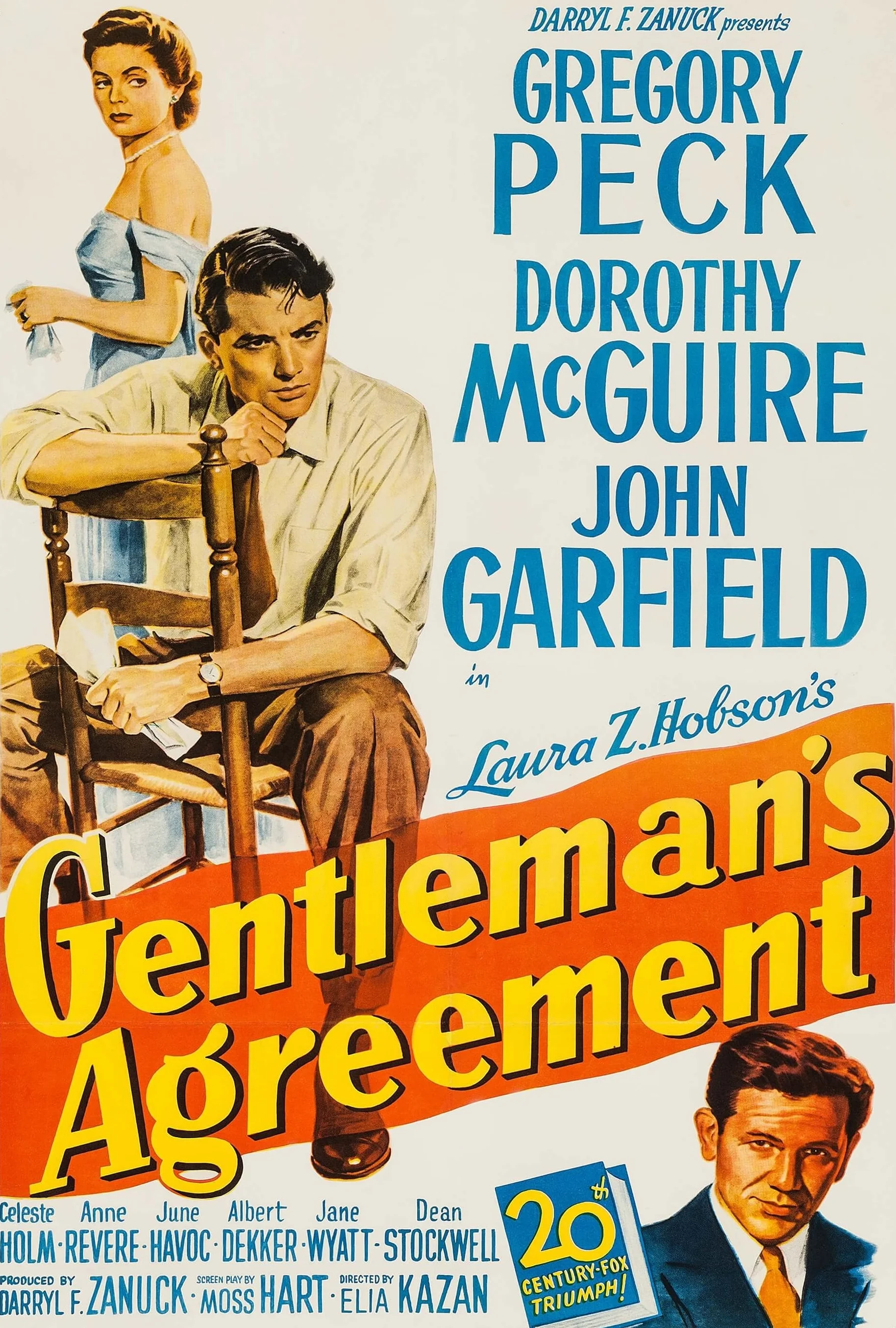On G List of Movie Reviews
(For optimum viewing, adjust the zoom level of your browser to 125%.)
Gentleman's Agreement (1947)
Rate:
6
Viewed:
7/17

7/17:
I won't go so far as to say that Gentleman's Agreement, which is one of the first two films to deal with
anti-semitism with the other being Crossfire, is an overrated Best Picture Oscar
winner because it's not.
But to think of it as Best Picture material is laughable. It's just not a great movie. Part of the reason why is how
poorly structured the plot is. I was ready to give it a '3' after sitting through the first hour of soapy, dated melodrama.
For a good deal of time, Phil Green was telling some people about his plan and then asked them all to keep it under wraps.
Therefore, the open secret became the film's running joke. I got lost when trying to figure out which role Green was
supposed to take on. Then, things completely changed when John Garfield finally showed up. From there on, the movie wasn't
the same anymore, and the second half is one of the most moving stuff I've felt in a while. I was being reminded of the themes
touched on in The Heart Is a Lonely Hunter and
Easy Rider. In short, it's powerful stuff.
Four thespians were Oscar-nominated for their performances, but none of them was named John Garfield! What a shock. A true
force of nature, he's the single biggest reason why the message works. He's authentic and plays an
authentic character. It's what he went through in real life. Everybody else is fake. Hence, John Garfield should've been
Oscar-nominated.
Whenever John Garfield appears, everybody, most notably Gregory Peck who wasn't mature enough to handle this kind of role,
pales in comparison to him. They're two or three levels below where he's at. It's overall a bad mismatch. Only
Celeste Holm stands out and gives a timeless performance, but her role doesn't have much to do with the main theme.
Mostly pointless, she plays a freewheeling, gay character.
The focus should've been on the writer's determination to get to the truth. Unfortunately, the wrecked plot structure
hinders Gregory Peck's progress as he was taking so long to get there and wasn't making much headway until John Garfield's
character showed up. When he did, the purpose finally became crystal clear.
In the meantime, the whole thing between Phil Green and his new girlfriend, Kathy Lacy, is a filler, wasting a
lot of my time. I've lost interest in their talks, lovemaking sessions, and going back-and-forth about their feelings.
Eventually, I couldn't care about their relationship, but when it felt important, I was earnestly rooting for Phil
to go for Celeste Holm's character because Kathy was a hypocrite who lived in a bubble.
Anyway, the real reason why I picked up Gentleman's Agreement is that I read a nonfiction book which mentioned
Darien, Connecticut, and that it was a notorious sundown town, having kept out African American and Jewish families for
decades. Nothing about it has changed to this day. On the other hand, it's a strange movie for entirely different reasons.
Elia Kazan metaphorically talks about facing issues head-on by not being silent about them when pressed. Yet, in 1952,
he gave the names of eight actors to the House Un-American Activities Committee (HUAC). Two years later, Kazan directed
On the Waterfront as a veiled way to justify his decision. Basically, his
career was built on the ruin of other people's careers, yet he remained an influential director, paving the way for
future Method actors.
As for John Garfield, the whole HUAC matter stressed him out so much that he was fatally struck by a heart attack at
the age of 39 the night before he was scheduled to appear in the hearing for the second time after being placed in the
blacklist for one year. What a sad loss of a fine actor who had so much more to give. Anne Revere was also forced to
appear before the HUAC but refused to and was therefore blacklisted, effectively ending her career.
Notice when Dave Goldberg was narrating a story, he finished it off with "Somebody said, 'Give me a hand with this sheeny.'
Those were the last words he ever heard." "Sheeny" is a vulgar word for Jew. While watching Gentleman's Agreement,
I was looking for Dean Stockwell but didn't spot him. So, I was like, "Where the heck is he?" and went on the internet.
It turns out he's the boy after all. Call me stupid, but I never realized Dean Stockwell started out as a child star.
Amazing.
All in all, I wish Elia Kazan did a better job with the plot structure for Gentleman's Agreement to make it more
even-keeled.